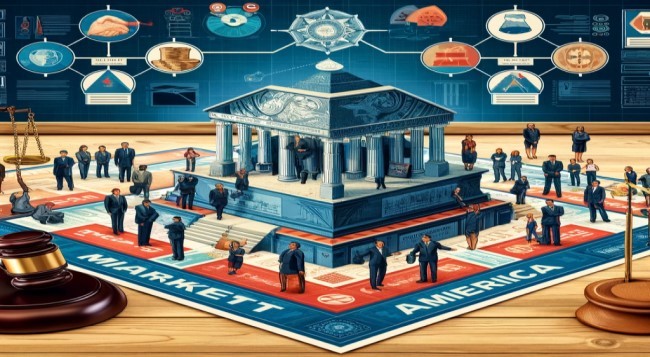Market America Lawsuit: Unveiling the Truth Behind the Allegations
Understanding the Market America Lawsuit: Facts, Implications, and Outcomes

The Market America lawsuit has garnered significant attention due to allegations that the company operates as an illegal pyramid scheme. As a multi-level marketing (MLM) company, Market America has faced numerous legal challenges, raising questions about its business practices and the impact on its distributors. This article aims to provide a comprehensive overview of the lawsuit, its implications for the MLM industry, and what it means for current and potential distributors.
The Background of Market America
A Brief History
Market America was founded in 1992 by JR Ridinger and Loren Ridinger. The company is headquartered in Greensboro, North Carolina, and operates globally. Market America offers various products, including dietary supplements, cosmetics, personal care items, and household goods. These products are sold under multiple brand names, such as Isotonix for supplements and Motives for cosmetics.
The Business Model
Market America operates on an MLM business model, referring to its distributors as “UnFranchise Business Owners” (UFOs). This model allows individuals to become independent distributors by paying a startup and ongoing monthly fees. Distributors earn money through product sales and recruit new members to join their sales teams.
The Allegations: What is the Market America Lawsuit About?
Pyramid Scheme Claims
The central allegation in the Market America lawsuit is that the company operates as an illegal pyramid scheme. Plaintiffs argue that the company primarily focuses on recruiting new members rather than selling products. This business model disproportionately rewards those at the top of the pyramid while most distributors incur financial losses.
Targeting Vulnerable Groups
The lawsuit also claims that Market America targets explicitly vulnerable groups, such as Chinese-American immigrants. This practice, known as “affinity fraud,” involves exploiting the trust within specific communities to recruit new participants. The plaintiffs allege that the company uses these connections to expand its market reach into Asia, particularly China.
Financial Misrepresentation
Another critical aspect of the lawsuit is the accusation that Market America misleads new distributors about potential earnings. The company promises financial success through a “two-year blueprint,” yet over 90% of distributors experience economic losses. The plaintiffs argue that these misrepresentations are part of a broader pattern of deceptive marketing practices.
Legal Proceedings: A Closer Look
Timeline of Events
The legal battle against Market America has been ongoing for several years. The initial lawsuit was filed in California but later moved to North Carolina. Here is a brief timeline of key events:
- March 2019: Plaintiffs file a class-action lawsuit in California.
- September 2019: The case is transferred to North Carolina.
- October 2019: Plaintiffs file an amended complaint reinforcing their allegations.
- January 2020: A magistrate judge grants Market America’s motion to compel arbitration, moving the dispute to private arbitration.
The Legal Grounds
The plaintiffs’ case is built on several legal grounds, including violations of federal and state laws. The allegations include racketeering, fraud, and violations of California state laws regarding business practices. The plaintiffs seek restitution for their financial losses, punitive damages, and regulatory changes to prevent further deceptive practices.
The Impact on Distributors
Financial Losses
One of the most significant impacts of the Market America lawsuit is on its distributors. The lawsuit claims that over 90% of distributors incur financial losses, primarily due to the high costs of joining and maintaining their status within the company. These costs include a $399 enrollment fee, $129 monthly fees, and additional expenses for inventory and training.
Emotional and Psychological Effects
Beyond financial losses, the lawsuit highlights the emotional and psychological toll on distributors. Many individuals join MLM companies like Market America with high hopes and dreams of financial independence. When these expectations are not met, it can lead to significant emotional distress and disillusionment.
Market America’s Response
Defending the Business Model
Market America has vigorously defended its business model, arguing that it operates as a legitimate MLM company. The company emphasizes that its distributors can earn money through product sales without necessarily recruiting new members. Market America also provides adequate disclosures about potential earnings and the risks involved.
Legal Strategies
Market America has employed several legal strategies in response to the lawsuit, including motions to dismiss and compel arbitration. By moving the dispute to private arbitration, the company aims to resolve the matter outside of the public court system, which can limit public scrutiny and media attention.
Broader Implications for the MLM Industry
Regulatory Scrutiny
The Market America lawsuit has broader implications for the entire MLM industry. The case has prompted increased regulatory scrutiny of MLM business practices, particularly those prioritizing recruitment over product sales. This scrutiny could lead to tighter regulations and oversight to protect consumers and ensure ethical business practices.
Industry Reputation
The lawsuit also impacts the reputation of the MLM industry. Allegations of pyramid schemes and deceptive practices can erode public trust in MLM companies, making it more challenging for legitimate businesses to operate. This reputational damage could lead to a decline in MLM participation and growth.
What Current and Potential Distributors Should Know
Due Diligence
Due diligence is crucial for individuals considering joining an MLM company like Market America. Prospective distributors should thoroughly research the company’s business model, compensation plan, and legal history. Understanding the risks and potential rewards can help individuals make informed decisions.
Legal Protections
Current and potential distributors should also know their legal rights and protections. Understanding the laws governing MLM companies and seeking legal advice can help individuals navigate potential challenges and protect their interests.
Conclusion: The Future of Market America and the MLM Industry
The Market America lawsuit serves as a cautionary tale for the MLM industry. It highlights the importance of ethical business practices, transparent marketing, and regulatory compliance. As the legal proceedings continue, the outcome of this case could have far-reaching implications for Market America and other MLM companies.
The lawsuit underscores the need for increased scrutiny and regulation to protect consumers from potentially exploitative business models. It also emphasizes the importance of due diligence and informed decision-making for individuals considering MLM opportunities.
As the case unfolds, staying informed about its developments and understanding the broader context can help individuals navigate the complex landscape of the MLM industry. Whether Market America can overcome these legal challenges and restore its reputation remains to be seen. Still, the lessons from this lawsuit are clear: transparency, ethics, and consumer protection are paramount in building a sustainable and trustworthy business.



